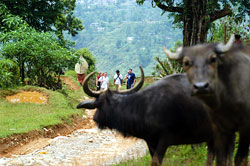|
|
The glitterati and the twitterati in the cocktail circuits of the capital are ready with their doomsday scenarios. Without a khattam kanccha theory it seems they cannot down the free booze at these soirees. They did so when Nepal opened up in early 1990s to say how we weren't ready for democracy. When Nepal opened for foreign investment, they predicted how domestic industry would collapse. When tariff was brought down, they complained about how our core industry (smuggling) would be affected. When private hydropower players came into the market, they complained of a national sell out.
In the rest of the country the story is different. In Dang, after five years people are rejoicing that there is no curfew after 8 pm. In Kabhre, villagers told your weekly Beed how they do not need to throw milk or vegetables away anymore because there are no more bandas. In Pokhara, there are more tourists and vehicles even late at night. The supply chain to and from Dhangadi or Mahendranagar is not disrupted. For the common Nepali, these are signs of hope that the ceasefire and the glimpse of a longterm peace have brought.
Yet, instead of celebrating these changes, we insist on proclaiming that the glass is half emptyl. The nabobs of negativity in the elite hobnob with expats in their hardship postings and feed each other's paranoia. These can be read, seen and heard very clearly, be it at the forums of business people or in interviews. Perhaps the American ambassador doesn't want things to return to normal because he wants to justify his new fortress-like embassy.
P K Dahal has perhaps in his own mind given more than he would have ever thought to concede in such a short span of time. Perhaps, he sees his party's strength in being able to engage the youth, earlier for a violent purpose and now for perhaps some nation building.
As this Beed wrote in an earlier column, Dahal has the opportunity to emerge as the Buddhadeb Bhattacharya of Nepal. However, if he gets carried away by his own rhetoric of land reform, revamping education and nationalisation of businesses he and his party will fail. As long as a Nepali can connect to the internet and buy goods with a card and get shipped by a global carrier, Nepal will be globalised. As a WTO member, Nepal will have to negotiate better but not cancel its membership.
The option remains of either seeing the glass half full or half empty. We have always opted to see the latter. As a young economist at a US university said, economics should go beyond looking at the magic potion of the annual budget. We need to go beyond looking at the eight-digit calculator as all big numbers will be reflected as an error.
Economies are always resilient. Let us recall all the action between 1990-1995 when the economy was deregulated and reforms initiated. New banks, finance companies, insurance companies, media houses, private institutions, civil society structuring, stock markets, carpets, garments came up. We can replicate that period and not squander this chance.




